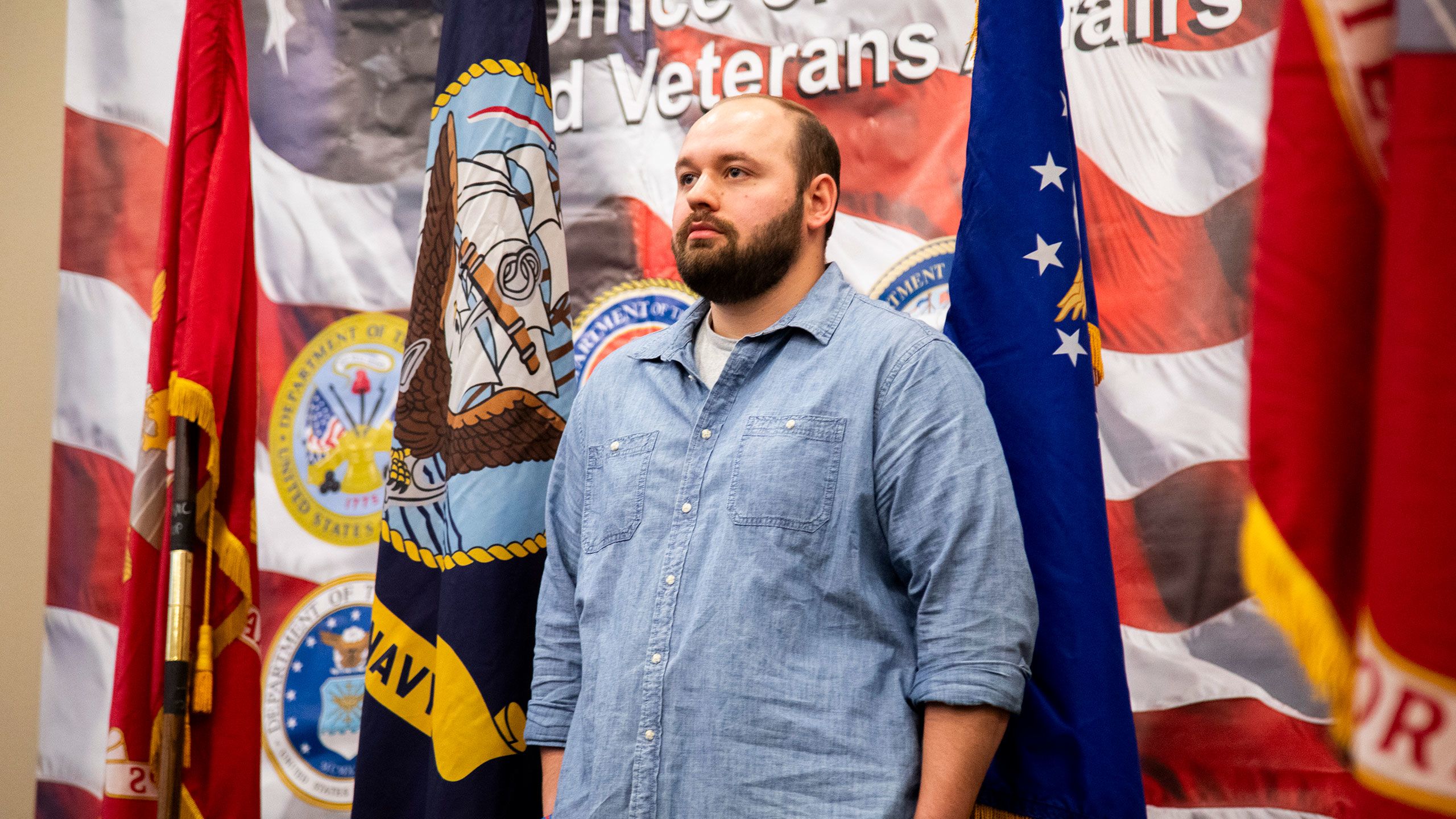Serving Those Who Served
Jacob Kopach advocates for the mental health of fellow Rutgers–Camden veterans

United States Marine Corps veteran Jacob Kopach’s life of service to fellow vets started with a combat wound. The injury forced an abrupt end to his military career, transitioning him into civilian re-entry and an academic journey at Rutgers–Camden. He is now part of an on-campus team connecting student veterans to benefits, resources, and programs as he studies for his master’s degree in social work.
Kopach spent four years in the U.S. Marine Corps as a Lance Corporal or E3 infantry rifleman and later as an infantry squad leader of a rifle squad with the 24th Marine Expeditionary Unit (MEU). The 24th MEU provided crisis response to areas in Jordan, Oman, and Yemen, where, during the Yemeni civil war of 2015, Kopach’s task force assisted with the evacuation of key U.S. personnel.
While deployed overseas, Kopach was wounded in combat. He was brought to Wounded Warrior Battalion at Camp Lejeune, which helps Marines either return to service or transition to civilian life. It was there that Kopach learned of Veteran Readiness and Employment (or Chapter 31) benefits, which would enable him to pursue higher education. He qualified for medical retirement from the military in early 2017.
Kopach has long been resolute in his pursuit of mental health work with veterans, having lost friends to suicide during and after his time in active duty. He was inspired to continue his education by his then-girlfriend, now wife, who earned degrees in psychology and criminal justice at Rutgers–Camden. He followed in her footsteps as a Scarlet Raptor, earning his bachelor’s degree in psychology.
Kopach now interns with the Dean of Students office, where he has organized a support group for student veterans transitioning out of the military. He understands why student veterans may be reluctant to participate, because he was once in that position himself.
“When I got out of the military, I tried to pick up where I left off, which wasn't a feasible option,” Kopach said. “After all those years when I wasn’t really in the veteran community, I felt more isolated.”
When he first started school, Kopach initially didn’t want to participate in anything beyond his classes. “There was no way that I was going to come back to campus for an event,” he said. “But that attitude didn't work out for me in the long run with my own mental health.”
“When I got out of the military, I tried to pick up where I left off, which wasn't a feasible option. After all those years when I wasn’t really in the veteran community, I felt more isolated.”

In a class, Kopach met a fellow student veteran named Drew Bendler, who connected him with others in the Rutgers–Camden veteran community, which later propelled him to seek a work-study position with Fred Davis, director of the Office of Military and Veterans Affairs and a United States Navy veteran. Kopach’s daily tasks vary, from answering student questions to helping plan the university’s annual Veterans Day Observance event. He has worked to promote veteran resources on campus, some of which he said do not exist at other universities.
“We have our officials who certify veterans’ education benefits, so we can help students understand the benefits,” Kopach said. “On top of that, we help them navigate disability claims, employment opportunities, and employment workshops. Last semester, we held a speaker series with guests who had served in Afghanistan, Vietnam, Korea, and World War II.”
Off campus, Kopach also runs a support group for veterans with post-traumatic stress disorder. With his master’s degree, he hopes to open his own counseling practice for veterans with post-traumatic stress disorder and traumatic brain injuries.
For Kopach, Veterans Day serves as a remembrance point, but not for his own time in the service.
“I've seen vets who I know have done heroic things but have never talked about them,” Kopach said. “You also hear from other vets who nonchalantly talk about the most traumatic moments in their lives. For many of us, the day is a time to reflect on the stories of veterans other than ourselves.”

Creative Design: Douglas Shelton
Photography: Ron Downes, Jr.
